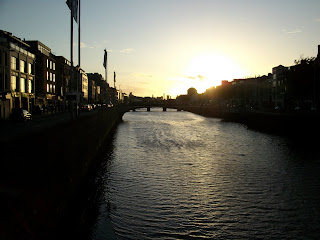
Sunset view from Ha'penny Bridge, Dublin
My brief stint as a tour guide was a success--Carly & Matt loved Leeds, thanks to a nice mix of sightseeing, shopping and pub crawls. We had a great time in Dublin, too. I instantly felt at home there, just like I'd felt the first time I came to the UK. As Carly put it, Ireland & Britain have all of the great qualities of Europe but without the language barrier.
Seeing my new home through their eyes really made me appreciate it more (no surprise there--it's always the case in exchange lit). They loved the pub culture, and it got me thinking about "third places". I'd read a piece a few years ago about Starbucks' successful strategy of creating a third place--a place outside of work or home. It's a public place that's intimate enough to hold a private conversation in, which is really a pretty interesting feature. When we went to pubs in Ireland, I realised that the pub is the third place in both Irish and British culture. Coffee chains have become more popular in recent years, but they close at 5-7pm and can't compete with a pub. During the Enlightenment era, coffee house culture was huge in London, but even then, I'm sure they never really surpassed the popularity of the pub (particularly in the working class). It also got me thinking about "third places" in the rest of the world. In France, it might be the cafe; in Italy, the 'fare un giro' habit of walking around the neighborhood after dinner and chatting with friends; in some boroughs of NYC, it's the act of sitting on the stoop with neighbors on warm nights, creating a 'street party' atmosphere.
With regards to my research, the idea of 'third places' has some interesting implications for exchange students. Culture learning might be measured in part by the extent to which international students discover local third places (and use them on a regular basis). If a student goes abroad and fails to engage with locals in a "third place" outside of work or home, I think they're missing out on an important part of culture learning...


